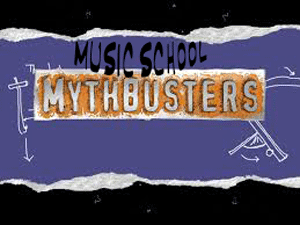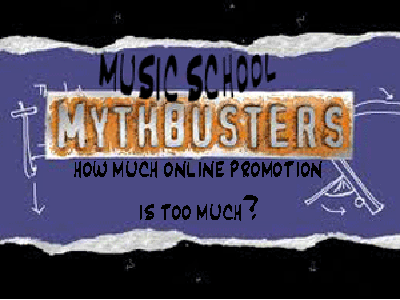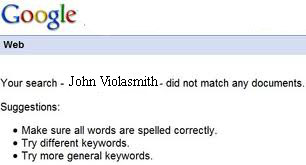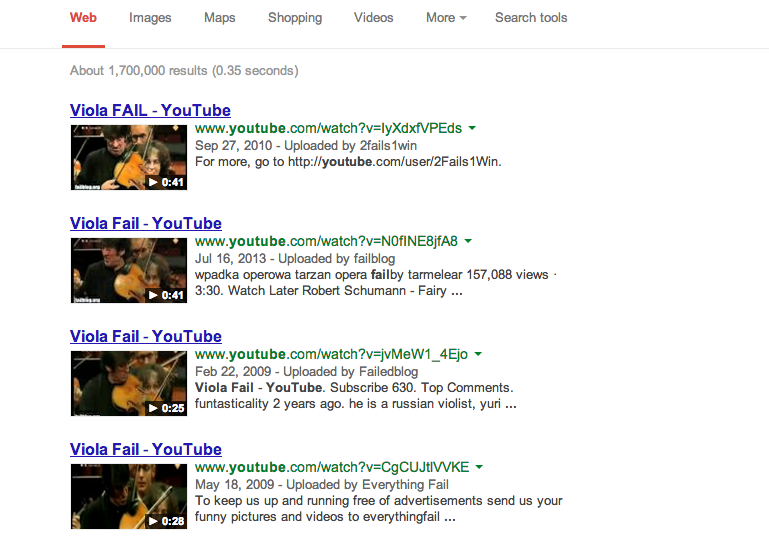Music School Mythbusters: How Much Online Promotion is Too Much?
The Myth
Nothing better distinguishes the millennial generation than the utilization of digital technology. Endless volumes of information are accessible at the swipe of a smart phone; cherished music collections are stored in discarnate virtual clouds; and Google, in a display of frightening omnipotence, often seems to know more about us than we do. But there is arguably no aspect of modern technology with greater implications for our budding careers than the myriad resources that lend themselves to self-promotion. The ability to create a website, open a Facebook or Twitter account, or upload a YouTube video is acquirable to anyone with a simple internet connection, and a lack of an online presence clearly undermines the competitiveness of any pre-professional. But is it possible to have too much personal material online? Is it really necessary to maintain an account on every social media site in existence? And should college-age music students aggressively promote themselves when, in many cases, they don’t have very much to promote in the first place? In this second edition of Music School Mythbusters, we’re going to find out.
The Argument for the Myth
Unless you live in a ghost town, chances are very high that you interact with the internet at some point in your daily routine. According to the International Telecommunications Union, approximately 81% of Americans used the internet in 2012, a percentage that isn’t going to get smaller anytime soon. Given this context, it’s obvious that at least some degree of online presence is mandated for an aspiring professional in any field. Prospective employers can and will Google you, and you don’t want their search to yield nothing but an old concert program that someone from your high school uploaded in 2008. You want them to be able to find your essential biographical details, such as those you might divulge when introducing yourself in person: your current job, where you went to school, a few noteworthy accomplishments, and perhaps some other relevant credentials. There are some people who shy away from putting even the most basic information about themselves online, but with the majority of pre-professionals actively updating their myriad of profiles with details of their latest accomplishments, to not have an online presence in 2013 is tantamount to not having a business card. Besides, even if you don’t post a word about yourself, there’s an excellent chance that someone else has, posing additional implications for your employment prospects–do you really want people to form their impressions of you via materials uploaded by a third party?
There’s simply no denying it–a strong online presence complete with videos, a recent biography, Facebook and Twitter pages, and more is a necessity if you’re going to be a serious competitor in the current field. Sure, it’s still possible to be successful while maintaining a determinedly offline lifestyle, but it’s indisputably disadvantageous.
The Argument Against the Myth
Or is it? While the above assertions are technically true, a very fine line exists between honestly representing your talent and overtly exaggerating it. Yes, you should market yourself, but at the same time, you must be careful not to allow your virtual personas, however unwittingly, to project an erroneous impression of your artistic abilities. While I’m not going to cite actual examples, the following fictional illustration should give you a general idea of what they entail. Imagine browsing the website of a prospective colleague and coming across the following biography:
Melinda Altocleff is one of the most exciting young musicians emerging today. She is currently pursuing her Master’s degree in Viola Performance at the prestigious University of Southern North Dakota at Hoople, where she studies with the world-renowned Tom and Mary Higgins Jones II Professor of Viola, John Violasmith. Praised by the press for her “obvious enthusiasm” and “interesting interpretations,” Melinda is already enjoying a career as a teacher, soloist, and chamber musician. She made her solo debut playing the first movement of the Hoffmeister concerto with the Hicktown High School orchestra in 2008, which was praised by the Hicktown High School Hollerer as “a very interesting experience,” and has studied at such prestigious summer festivals as the Prairiemount Viola Institute and the Hicktown High Summer Music Camp. She has had the extreme privilege of playing in masterclasses for Not-Very-Well-Known Teacher A, Somewhat-Well-Known-Teacher F, and Wants-to-be-Well-Known Teacher Z, and once had a lesson with Hotshot Teacher A. As a member of the Misellus String Quartet, she has performed in various locations around Hoople, including an acclaimed performance of Beethoven’s Opus 18 No. 1 string quartet at the Hoople Presbyterian Church in 2012. A dedicated and sought-after teacher, Melinda currently maintains a private violin studio in her studio apartment, and is hoping to attract viola students in the near future.
Okay, so Melinda’s bio is a bit on the extreme side (especially considering that she attends a non-existent music school), but it’s of a variety that we’ve all surely encountered before–flowery language and over-the-top descriptions used to enhance relatively insignificant credentials. Of course, that’s not to say that individuals with less success and experience should decline from posting information about themselves–I firmly believe that being successful as a musician requires no more than simply sharing one’s gifts and abilities with others, and that nobody should be discouraged from pursuing music seriously even if they haven’t attended the best schools, studied with the best teachers, or received rave reviews. What I find concerning is that students often feel compelled to create such an extensive virtual presence for themselves and subsequently feel the need to run their bios through the professional cookie-cutter in order to justify the existence of their website, Twitter account or Facebook page. The prestige of owning one’s personal websites, until a relatively short time ago, was typically restricted to very well-known individuals, and even though anyone on the planet today can create one in about thirty seconds, an unspoken need for precedent still seems to exist. Yet, in a somewhat ironic twist, many professionals whose abilities, experience and credentials do merit such an online presence barely have one at all. Websites were merely the talk of computer geeks when today’s middle-aged professionals began their careers, and considering that things have gone just fine without a virtual venture, most of these folks feel no need to get online now. Besides, for some types of music jobs, the extent of your online presence will do little for your chances. When you’re auditioning for a professional orchestra, it won’t matter that you have ten social media profiles and a flashy website; if your Strauss is out of tune, you’re out of luck.

“The candidate wishes to inform you that they can be found on Twitter at @melindaviola, Facebook.com/MelindaAltocleff, YouTube account ViolaRox, Google + account Altocleff22, LinkedIn Melinda Altocleff, and their personal website, www.melindaaltocleff.com.”
A more critical aspect of this discussion is the choice to post personal videos and recordings on YouTube or a personal website. The information that you allow others to discover about yourself is certainly important, but not nearly as much as videos and other media that demonstrate what you really can–or cannot–do. The idea that you have to have a YouTube channel or the like could very well lead some students to upload videos of a less-than-decent artistic quality, and ultimately cause them more harm than good. Besides, even if you upload better quality media in the future, we all know that the information engraved upon the face of the internet is never erased–and you certainly don’t want that lackluster recording from your junior recital to somehow pop up when a prospective employer is combing the search engines five years down the road.
The Conclusion
While having an online presence is certainly necessary to maintain competitiveness in the current field, it’s definitely not imperative–nor, in many cases, advisable–to pull out all the stops. Going overboard on the internet just because it seems like the thing to do cannot only hurt you, but project an impression of yourself and your abilities that might constitute a considerable departure from reality. Ultimately, honesty is the best policy when considering the development of your online presence. You shouldn’t post material online for the mere purpose of self-promotion, but for the purpose of sharing who you are as an artist and what you want to accomplish with your gifts. A small, but honest representation of your abilities will be worth much more than an overblown website or a truth-stretching bio–both on and off the internet.
More in this Series:
Is Playing Politics Necessary?
Have your own myth that you would like to see “debunked” or “justified” in “Music School Mythbusters”? There’s still three more editions to go! Email (info@polyphonic.org), Facebook (Facebook/Polyphonic.org) or Tweet (@polyphonic.org) us today!





